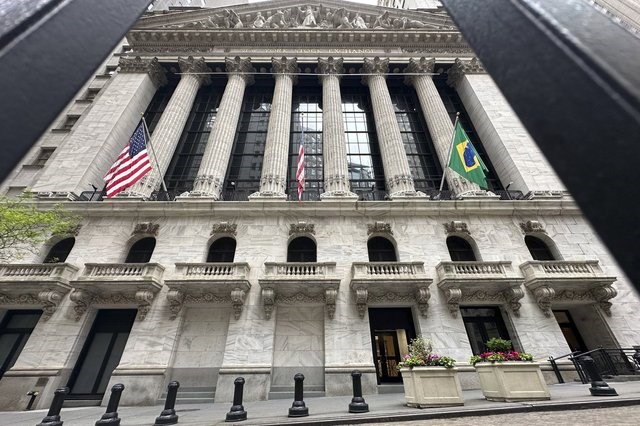NEW YORK (AP) — Stocks are opening slightly lower on Wall Street as earnings reporting season ramps up for big U.S. companies. The S&P 500 edged down 0.1% in early Tuesday. The Dow Jones Industrial Average slipped 69 points, or 0.2%, and the Nasdaq composite was down 0.2%. Dozens of companies in the S&P 500 are reporting their results for the spring, with a couple highly influential Big Tech companies coming after trading ends for the day: Google’s parent company Alphabet and Tesla. UPS tumbled 11.7% after delivering weaker profit and revenue than analysts expected. Paint maker Sherwin-Williams jumped 4.2% after reporting stronger-than-expected results.
THIS IS A BREAKING NEWS UPDATE. AP’s earlier story follows below.
NEW YORK (AP) — Wall Street was essentially flat early Tuesday as markets digest a full slate of corporate earnings ahead of some important government economic data due later in the week.
Futures for the S&P 500 and the Dow Jones Industrial Average each ticked up less than 0.1% before the bell.
UPS tumbled 8% after the package delivery company missed Wall Street's sales and profit targets. The Atlanta company's package delivery volume rose for the first time since 2022, but a charge of $120 million, most of which was used to settle an international regulatory matter, cut into profits.
General Motors beat analysts sales and profit targets, sending its shares 2.5% higher before the bell. Coca-Cola Co. rose 1.5% after the beverage giant beat Wall Street forecasts and raised its full-year sales outlook.
Analysts are expecting companies in the S&P 500 to deliver the strongest profit growth for the latest quarter since the end of 2021, according to FactSet.
Tesla and Google parent company Alphabet report their latest results after the bell.
Also coming later Tuesday is the government's latest data on existing home sales. Hurt by high interest rates, the housing market has been in a two-year slump.
Coming later this week is the government first estimate for gross domestic product in the second quarter and an inflation reading that carries significant weight with the Federal Reserve. Investors hope that the reading comes in low again and spurs the central bank into cutting its benchmark rate, which is at its highest level in more than two decades.
In Asian trading, Tokyo's Nikkei 225 closed nearly unchanged, at 39,594.39.
Chinese markets turned lower as investors remained skeptical over recent policy decisions. The Hang Seng in Hong Kong lost 0.9% to 17,469.36. The Shanghai Composite index shed 1.7% to 2,915.37 in its biggest single-day loss in six months.
The domestic focused CSI 300 index slipped 2.1%.
Baosteel Iron & Steel Co. fell 2.9%. The company, the world's largest steelmaker, announced Tuesday that it was buying Nippon Steel's 50% stake in their joint venture, Baosteel Nippon Steel Automotive Steel Sheets, for 1.76 billion yuan ($242 million). The venture is approaching the expiration of its contract and demand for steel has weakened, prompting Nippon Steel to focus elsewhere, such as its contested bid for U.S. Steel.
China's central bank cut two key interest rates by 10 basis points on Monday, moving to ease credit and pep up the economy, following a major policymaking meeting of the ruling Communist Party that focused on longer-term reforms.
The People's Bank of China also reduced collateral required by its medium-term lending facility and also reduced the interest rate for its standing lending facility by 10 basis points to 2.7% for its seven-day loans and 3.05% for its one-month loans.
But the recent moves so far have not boosted markets in a mood for more aggressive short-term action to rev up the slowing economy.
“Size matters. And obviously, a 10 (basis point) cut is not particularly inspiring. Certainly, nowhere in the vicinity of ‘big gun’ stimulus, which is arguably what the economy needs,” Mizuho Bank said in a commentary.
South Korea's Kospi advanced 0.4% to 2,774.29, while the S&P/ASX 200 jumped 0.5% to 7,971.10.
Taiwan's Taiex surged 2.8% as Taiwan Semiconductor Manufacturing Co., the world's largest maker of computer chips, gained 4.3%, rebounding from recent losses on renewed optimism over the promise of artificial intelligence.
In Bangkok, the SET fell 1%.
In Europe at midday, Germany’s DAX advanced 1.1%, while the CAC 40 in Paris gained 0.2%. In London, the FTSE 100 inched down 0.1%.
In other dealings, the U.S. dollar fell to 156.19 Japanese yen early Tuesday from 157.04 yen late Monday. The euro fell to $1.0861 from $1.0891.
U.S. benchmark crude oil lost 38 cents to $78.02 per barrel in electronic trading on the New York Mercantile Exchange.
Brent crude, the international standard, gave up 36 cents to $82.04 per barrel.
On Monday, the S&P 500 rose 1.1%, breaking a three-day losing streak. It was the first gain for the benchmark index since it set an all-time high on July 16.
The Dow Jones Industrial Average added 0.3% and the Nasdaq composite climbed 1.6% to 18,007.57.
Elaine Kurtenbach And Matt Ott, The Associated Press

